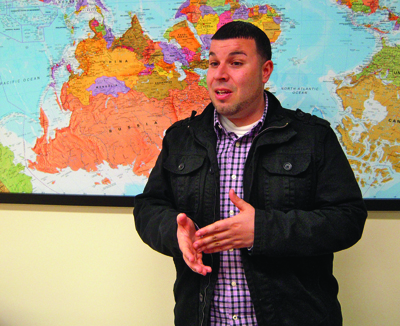Parsing the ‘I’ Word
Linguistic Anthropologist Jonathan Rosa ’03 Lends His Voice to the Debate on Immigration

Jonathan Rosa ’03 and other activist linguists have stirred media discussion regarding retention of the term illegal immigrant. As The New York Times reported in October, the linguists “don’t like the term because they say it is polarizing and establishes a black-and-white framing of the larger immigration debate.” Photo by David Flores.
When Jonathan Rosa ’03 and his colleagues at the University of Massachusetts–Amherst talk about the “i-word,” it has nothing to do with first-person singular and everything to do with the heated debate about immigration reform.
“Language has to be seen as a profound and powerful form of social action,” says Rosa, an assistant professor of linguistic anthropology. “We are proactive—not activist in the straightforward sense—we’re rooted in the scholarly perspective and history.”
The proactive partners in this case are Rosa and other members of the American Anthropological Association (AAA) and its Language and Social Justice Committee, along with the Drop the I-Word campaign, which was organized by the Applied Research Center and its Colorlines.com news website.
The campaign asks for signatories to the following pledge: “I will not call any human being ‘illegal.’ The racially charged slur and related terms confuse the immigration debate, fuel violence and don’t reflect my values. I join communities nationwide in challenging all media to do the same.”
“The ‘i-word’ debate is tied to broader concerns about legitimacy and migration rights,” Rosa explains. “Language plays a central role in inclusion and exclusion.”
Rosa was encouraged to take a leadership position in the “i-word” discussion, including volunteering to draft a statement for the group, by his mentor Ana Celia Zentella, one of the AAA’s senior committee members and Swarthmore’s Eugene M. Lang Visiting Professor for Issues of Social Change in 2009–10.
Born in Rochester, N.Y., but raised in Brockport, N.Y., Rosa’s interest in language and in political projects began at Swarthmore as an honors special major in linguistics and educational studies. At the College, he was awarded a Mellon Minority Undergraduate Fellowship (since renamed the Mellon Mays Undergraduate Fellowship) that led him away from his original goal of teaching high school to becoming a researcher and scholar.
In 2010, he received his doctorate from the University of Chicago where he discovered linguistic anthropology. He knew he’d found the perfect discipline, because it combined everything that interested him: social theory, language, education, and culture.
Early last fall, Rosa’s statement about the language of immigration was completed and began circulating among the committee and the Drop the I-Word campaign. The members endorsed it, then it was endorsed by the Society for Linguistic Anthropology and associated groups, such as the Association of Latina and Latino Anthropologists.
The statement was circulated more widely, then ABC News Univision produced a story. As the debate heated up, Rosa was interviewed by national media, such as NPR, CNN, U.S. News & World Report, Huffington Post Live, and MSNBC about the appropriateness of the term “illegal immigrant.”
As part of the goal to change the language of the debate, the group was interested in holding the media to “its own standard of unbiased, neutral, accurate language,” Rosa says. He points out that it’s problematic when media institutions like the Associated Press or The New York Times use “loaded language that is tied to a specific political position,” such as “illegal immigrant,” which was promoted by conservative anti-immigrant groups, and “undocumented immigrant,” which became associated with liberal/progressive ideology.
This April, The Associated Press removed “illegal immigrant” from its popular stylebook. Rosa said the change was a culmination of pressures, but the shift was important.
The language of illegality has been used historically to deny people the right to live anywhere, including for the Jews in the context of World War II, Rosa says. “The implications of what it means to dehumanize a population are very scary.”
In addition, the language is “oxymoronic, since the U.S. Immigration and Nationality Act defines immigrants as people who have been lawfully admitted for permanent residence.”
For an unbiased “replacement” term, the suggestion was “unauthorized migrant,” but Rosa argues that focusing on finding a new term is in many ways beside the point.
“What we should call them is the wrong question,” he asserts. “The problem is an unjust set of migration policies. New terminology is not a solution to the problem.” As the result of all of the debates and discussions, he would like to see a “reimagination of migration as a fundamental right,” not just a pathway to citizenship.
“How many [current migrants] have citizenship but are treated as second-, third-, fourth-class citizens?” he asks. Migration rights must ensure that citizenship is a guarantee of being a full member of the society.
“Often the problem is that debates about language are addressed as though it’s just about language,” he says. As a linguistic anthropologist, he knows it’s not. He also knows that he and his colleagues must be a part of these debates as advocates of positive, and sometimes powerful, social change.
 Email This Page
Email This Page